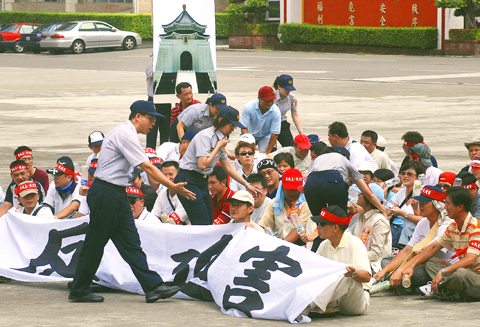With the country preparing to receive an influx of Chinese tourists tomorrow, a Taipei City councilor warned of the possible threats the tourists pose to the city’s environment and public safety, and the difficulty local governments will face in trying to punish those who violate the law.
Independent Taipei City Councilor Chen Chien-ming (陳建銘) said it would be difficult for the Taipei City Government and other government agencies to trace Chinese tourists who violate regulations, such as those against spitting or throwing cigarette butts in public places, to fine or otherwise punish them.
“The city government should conduct assessments on all the possible impacts of Chinese tourists. I call upon the city government to set up regulations to handle violations made by Chinese tourists,” Chen told a press conference at the Taipei City Council.

PHOTO: CHIANG YING-YING, AP
Under the agreements signed in Beijing last month between the Straits Exchange Foundation and China’s Association for Relations Across the Taiwan Straits, a 600-member inaugural Chinese tour group will arrive in this country tomorrow when the two sides launch weekend charter flights.
President Ma Ying-jeou (馬英九) has pledged to open Taiwan to 3,000 Chinese tourists per day in the initial stage, with the number increasing to 10,000 per day within four years.
In response to Chen’s concerns, Taipei’s Law and Regulation Commission said that the rules regulating Chinese tourism allow the city government to issue tickets to tourists who break the law.
The department said the city government was allowed to ask tourists who violated regulations to pay the fines immediately, and to fine the travel agencies handling the offenders if the tourists failed to pay.
Liang Hung-lang (梁宏郎), a division chief of the city’s Environmental Protection Department, said if Chinese tourists violated environmental regulations, the department will fine them and ask the travel agencies to help handle the situation.
Meanwhile, the National Police Agency staged a mock exercise to simulate potential situations they might have to deal with because of the influx of Chinese visitors.
Police officers from various tourist spots nationwide took part in the exercise.
Among the scenarios included in the exercise were police intervening to prevent Chinese visitors from being forced by vendors to buy souvenirs or visitors forcing vendors to sell them souvenirs, and Chinese visitors encountering people demonstrating against them.
Minister of the Interior Liao Liao-yi (廖了以) watched the exercise and afterward said the simulation had made him optimistic about the police departments’ ability to handle any problems.
“Our officers are professional in what they do,” he said.
“It seems to me that they know how to fix problems, if there are any, within the shortest period of time. This is exactly what we need,” he said.

‘DENIAL DEFENSE’: The US would increase its military presence with uncrewed ships, and submarines, while boosting defense in the Indo-Pacific, a Pete Hegseth memo said The US is reorienting its military strategy to focus primarily on deterring a potential Chinese invasion of Taiwan, a memo signed by US Secretary of Defense Pete Hegseth showed. The memo also called on Taiwan to increase its defense spending. The document, known as the “Interim National Defense Strategic Guidance,” was distributed this month and detailed the national defense plans of US President Donald Trump’s administration, an article in the Washington Post said on Saturday. It outlines how the US can prepare for a potential war with China and defend itself from threats in the “near abroad,” including Greenland and the Panama

A wild live dugong was found in Taiwan for the first time in 88 years, after it was accidentally caught by a fisher’s net on Tuesday in Yilan County’s Fenniaolin (粉鳥林). This is the first sighting of the species in Taiwan since 1937, having already been considered “extinct” in the country and considered as “vulnerable” by the International Union for Conservation of Nature. A fisher surnamed Chen (陳) went to Fenniaolin to collect the fish in his netting, but instead caught a 3m long, 500kg dugong. The fisher released the animal back into the wild, not realizing it was an endangered species at

The Chinese Nationalist Party (KMT) is maintaining close ties with Beijing, the Democratic Progressive Party (DPP) said yesterday, hours after a new round of Chinese military drills in the Taiwan Strait began. Political parties in a democracy have a responsibility to be loyal to the nation and defend its sovereignty, DPP spokesman Justin Wu (吳崢) told a news conference in Taipei. His comments came hours after Beijing announced via Chinese state media that the Chinese People’s Liberation Army’s Eastern Theater Command was holding large-scale drills simulating a multi-pronged attack on Taiwan. Contrary to the KMT’s claims that it is staunchly anti-communist, KMT Deputy

The High Prosecutors’ Office yesterday withdrew an appeal against the acquittal of a former bank manager 22 years after his death, marking Taiwan’s first instance of prosecutors rendering posthumous justice to a wrongfully convicted defendant. Chu Ching-en (諸慶恩) — formerly a manager at the Taipei branch of BNP Paribas — was in 1999 accused by Weng Mao-chung (翁茂鍾), then-president of Chia Her Industrial Co, of forging a request for a fixed deposit of US$10 million by I-Hwa Industrial Co, a subsidiary of Chia Her, which was used as collateral. Chu was ruled not guilty in the first trial, but was found guilty